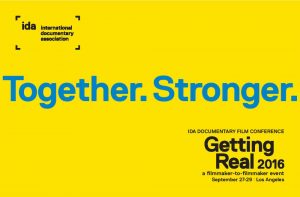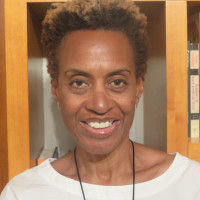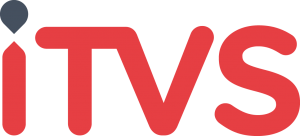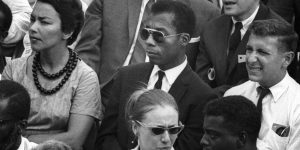 Getting Real 2016 was a remarkable gathering of documentary filmmakers, under the auspices of the International Documentary Association (IDA). What I heard most: Diversity will make us stronger; let’s get better business practice together; we need to build community. Also, President Obama agrees with me.
Getting Real 2016 was a remarkable gathering of documentary filmmakers, under the auspices of the International Documentary Association (IDA). What I heard most: Diversity will make us stronger; let’s get better business practice together; we need to build community. Also, President Obama agrees with me.
Better with Diversity
Firelight Media cofounder Marcia Smith said it clearly in her keynote: What is at stake in diversity is democracy. This is not about inclusion, it is about changing the dangerous path we are on as a nation and have been on in perpetuating pervasive racism and other forms of exclusion. And Haitian filmmaker Raoul Peck brought the point home with his trailer for I Am Not Your Negro, his portrait of James Baldwin’s intellectual journey. It kicks off with Baldwin saying to talk show host Dick Cavett that the issue isn’t whether Black people are getting ahead, but what will be the future of the nation.

Marcia Smith from Firelight Media
“Documentary film is grounded in activism,” Smith said. Organizing creates opportunity; it forces doors to open. Meanwhile,she said, change reality where you are—for instance, film festivals can showcase films by people of color, teachers can mentor them, organizations can hire them. What Firelight is doing is building community, while producing films.
Do business better
Documentary filmmakers run mom ‘n pop operations all over the country. As I heard in a panel I moderated—and in the hallways, too—isolation is a real problem. Even if you’re in one of the cities where you have plenty of community, you can tunnel down into your own projects and lose sight of community when you come up for air.
Conferences like Getting Real were, for attendees, valuable in part for that renewal of community. But there are both national and regional/local organizations that build networks, too, and, as IDA head Simon Kilmurry reminded people, filmmakers need to join and participate in them.
That way, as a community they can be better represented before policymakers, explained strategist Michael Bracy. “There’s a billion dollars waiting to go to somebody,” he pointed out. “If documentary filmmakers never show up in the policy process, nobody knows your needs.” When they do, things happen; IDA has been part of the successful move to win permission from the Copyright Office to break encryption on DVDs for fair use, for example.
Funders are supporting community-building and organizations, too. The Wyncote, Knight, MacArthur and Ford foundations among others had representatives present, interested in stronger networking and public presence for documentary filmmaking. Some were also conference sponsors.
Could doc filmmakers share workspaces? Collaborate virtually with colleagues to lower travel costs? Win group discounts on legal services or insurance? Win tax credits and more from local, state and federal government? Yes, was the answer, and much more—if we organize ourselves.
Build community

Grace Lee
And the inspiration was not in short supply, either. Whether it was Laura Poitras talking about the evolution of Field of Vision and the realities of high-risk filmmaking, or Grace Lee asking, “”What time is it on the clock of the documentary world?,” or Renee Tajima Pena talking about the history of organizing among documentarians, or Joaquin Alvorado talking about making art with journalism, or Steve James talking about the shared project of telling meaningful stories about suppressed American experience, filmmakers were modeling for each other how to connect.
There are plenty of next possible steps. The array of organizations participating in the conference, including a broad range of sponsors, demonstrated the wealth of potential points of connection for filmmakers. CMSI co-director Caty Borum Chattoo’s research, which launched a buzz that went throughout the conference, showed the importance of connection. As her data showed, for too long, the documentary field has been too white, too poor, too male, and too separated from its potential support systems.
ITVS
 For me personally, the most treasured connection moment was the 25th anniversary party for the Independent Television Service. And not just because I’m currently a board member, but also because it’s an astonishing example of what organizing and community can do.
For me personally, the most treasured connection moment was the 25th anniversary party for the Independent Television Service. And not just because I’m currently a board member, but also because it’s an astonishing example of what organizing and community can do.
ITVS was a creation of filmmaker organizing, which built over a decade of frustrating relationships with the Corporation for Public Broadcasting. Filmmakers—primarily through the then-dominant national organization Association of Independent Video and Filmmakers–went to Congress, arguing that their films looked like America (and even could be made in the Congressional representative’s district) but did not get enough airtime on America’s public media. Congress tended to agree. Finally, with coordination from Rep. Henry Waxman from California, Congress gave up hoping that CPB would pay attention and allocated a separate line item of its funding for a production service that would fund independent filmmakers. CPB officials were very angry with independent filmmakers in 1988.
At the ITVS party, by contrast, CPB vice president Sylvia Bugg openly heralded the achievements of ITVS. Indeed, today, ITVS coproduces dozens of films a year, along with transmedia, short films, curated TV series, and has pioneered a new viewing platform, OVEE. Diversity sits at the core of its mission; three-quarters of its filmmakers are people of color and more than half are women. Its topics range across the American landscape. It is a trusted partner of CPB and public TV stations. CPB regularly trumpets ITVS’ achievements in its requests for renewals of Congressional funding. Independent Lens, its flagship ITVS series, has, like POV, audience ratings that are dramatically higher for both young people and minorities than most PBS programming.

I Am Not Your Negro, the latest film of Raoul Peck.
ITVS has become an essential part of a public television for a stronger public. When Raoul Peck thanked ITVS for coproducing I Am Not Your Negro, he went on: “Everyone should go to Congress and insist on more federal funding for public television. This is what you need if you want to get more voices heard.”
So this isn’t about being nice to the disenfranchised. As Marcia Smith said, this is about American democracy. President Obama said so too—in a letter he sent to ITVS the day before the ITVS anniversary party and read there. Here it is:
I send warm wishes to all those marking the 25th anniversary of the Independent Television Service (ITVS).
As Americans our fates are bound together. Only when we listen to and see ourselves in one another can we make our Nation’s founding promise real in the lives of all our people. Organizations like ITVS call on citizens across our country to open their hearts and minds to the experiences of others. By working to ensure diverse and complex perspectives are known and heard, you are cultivating an engaged and informed citizenry and reminding us of the power of each of us has to shape the world we share.
President Obama’s remarks can apply to the field at large. The work of helping to build a nation we can all live in happens where we are.
And P.S.: If you want to hear more specifics from the conference experience, D-Word was live-blogging throughout.
